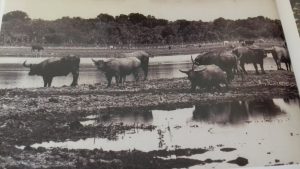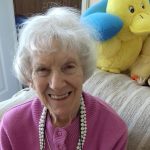 |
| The harmless buffaloes |
Just for a feeling of glory they downed him,
 |
| The Trophy |
By Judy
Born in London in 1924, my upbringing and education by governesses and select schools were probably typical for certain families of that period which followed the end of the First World War. When war broke out again in 1939 I left school without having passed my exams and lived for a while in Narborough helping out in the apple orchards. In 1942 I joined WAAFs (Women’s Auxiliary Air Force) as a motor transport driver. After training, I was based first at RAF Marham in Norfolk, and in 1944 was posted to RAF Bourn where I drove aircrew of a Mosquito Squadron to and from their kites when on ops. I was demobbed in 1946, a year after VE Day and I returned to Narborough, taking weekly trips to London for singing lessons. Using the name Rose Ash I had a stint on the stage as a chorus girl in the touring company of the musical comedy Annie Get Your Gun. I became third understudy for the part of Annie Oakley and when the star, Barbara Shotter, suddenly became ill on the opening night at the Liverpool Empire Theatre, played the part as the other understudies were also ill.
I loved my stage days but decided I wanted to see more of the world and joined a group travelling to India on a rickety old bus. From there I intended flying over to Australia. Unfortunately, I picked up some nasty complaint en route and had to return to England to recover. Fit again, I became a Ten Pound Pom and, in 1958, I sailed away from Tilbury Docks on the Orient Liner ‘Orontes.’ For two years I hitch-hiked in Australia ending up in Darwin from where I intended flying back to England to start off again in another direction. However, as a last fling, I went on a Safari and met one of the crocodile hunters, called Tom, who worked for the camp.
I married him and we set up our own very primitive ventures for travellers to the area. No bitumen anywhere-just rough tracks on which wild buffaloes were likely to hinder one’s journey. We progressed over the years until the bitumen and civilisation came to the area and we retired to a now modern Darwin city. Sadly, Tom took ill and died shortly after and, with a sudden hankering for the education I had missed out in my childhood, I applied to the newly opened Northern Territory University(later to become Charles Darwin University) and was accepted on probation. Amazingly I went through all the stages of Bachelor of Arts ending with my doctorate in 2008. After so many adventures in my life, I decided to write my autobiography called An English Rose in Kakadu which was published. At which point I felt a hankering to return to my family in England.
I now live in a beautiful Retirement Home called Cavendish Court in a new town called Cambourne built on the edge of the wartime airfield RAF Bourn, where I had been stationed. My days are always full, going through old papers, playing on my keyboard, writing short stories or poems and enjoying visits from the family or walking(with my stroller) around the garden with its birds singing merrily or through the nearby woods. But suddenly the world has been hit by the corona virus and life for everyone is on the verge of chaos and collapse.
Footnotes
- These buffaloes were not like the fearsome African ones but domesticated water buffaloes from the Philippines brought to Australia in the 1800s to help in establishing settlements in the Northern Territory
